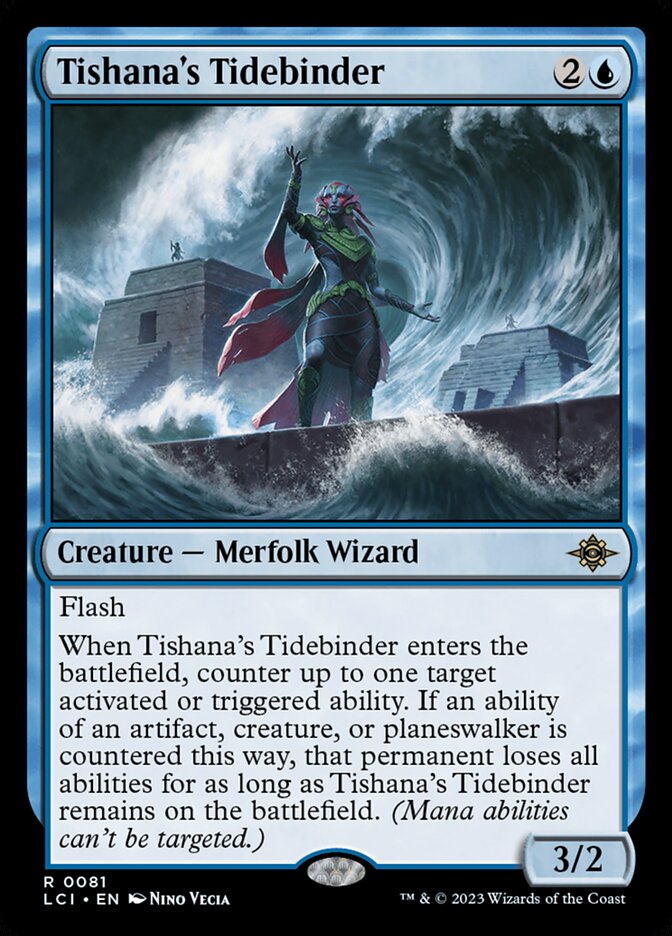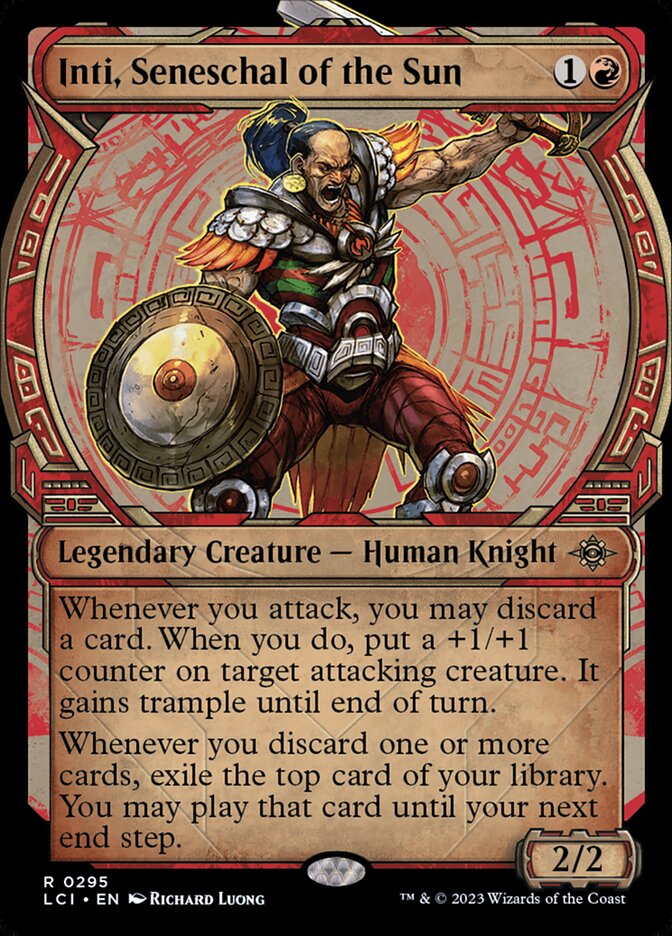We found so much use of Tishana’s Tidebinder at Pro Tour Thunder Junction that we’re bringing you a few more rules and tips on its interactions! So, without further ado, here are a few more interesting Tidebinder rulings!

Ward (again)
We mentioned Ward in the last article, but we should also clarify, that an artifact, creature, or planeswalker whose Ward ability gets countered will lose all abilities. Ward won’t be there to trigger again if the trigger’s source survived the initial thing that caused Ward to trigger.
Dark Depths and State Triggers
Although we mentioned Tidebinder and Dark Depths in our last article we determined further explanation is required. Dark Depths isn’t a reflexive trigger at all, the whole “When Dark Depths has no ice counters on it, sacrifice it. If you do…” so even if you counter it with Tidebinder, it will just trigger again, since it still has no counters, and hasn’t been sacrificed. (It’s not an artifact, creature, or planeswalker)
Tidebinder and Inti

During a Pro Tour feature match, a player wanted to Tidebinder Inti, Seneschal of the Sun, but wasn’t sure which trigger they should target. Inti technically has 3 triggers, one on declaring to attack, one reflexive off the first trigger, and a trigger on discarding cards (in general, but will trigger from the first as well). The safest strategic play is to counter the first ability. If you care about the extremely minute details, read below or if you want to counter the 2nd or 3rd triggered abilities Inti generates.
- If you counter the 1st trigger (discard on attack), none of its subsequent triggers will trigger and it loses all abilities.
- If you counter the 2nd (reflexive trigger), then Inti’s third trigger (exile a card) will still have triggered from the first trigger (discard), and still be on the stack, and Inti won’t lose all abilities since reflexive triggers aren’t abilities the creature has.
- If you counter the 3rd trigger, you have to be specific on when you’re countering it, and what order the opponent put the 2nd and 3rd on the stack:
- For those who care about the extreme specifics it matters which order the Inti player put the triggers on the stack (when Inti targets itself):
- If they have the 2nd below the 3rd, then the 2nd trigger will still resolve after the 3rd trigger is countered, and give the attacking creature target Trample after Inti loses all abilities.
- If they have the 2nd above the 3rd on the stack, then make sure you counter the third trigger after the 2nd resolves, so that Inti does not regain trample after losing all abilities (won’t matter if Inti targets a different creature, of course, for the counter and trample).
Agatha’s Soul Cauldron
Agatha’s Soul Cauldron gives other creatures that have a +1/+1 counter activated abilities. If you counter the activated ability of the cauldron, it loses the ability to give other creatures activated abilities. The cauldron’s ability granting continuous effect is dependent (A Dependency!!) on the Tidebinder taking away its abilities, because if it has the ability, it can give other creatures abilities. So we always apply the Tidebinder first, which negates the cauldron’s ability granting – so the other creatures with +1/+1 counters won’t have any gained activated abilities from the cauldron.
If you want to read more on Agatha’s Soul Cauldron, check out Brook’s Babbles here!
Tidebinder and Delayed Triggers (like Blitz!)
Creatures cast with Blitz have set up a delayed triggered ability at end of turn to sacrifice them. If you counter this with Tidebinder, the creature won’t be sacrificed from this effect, even in later turns. However, Tidebinder won’t remove the creatures’ abilities, including Haste, and the “When this permanent is put into a graveyard from the battlefield, draw a card.”, because the delayed trigger is not an ability the Blitz creature has.
This is in contrast with delayed triggers on cards like Underworld Breach. Breach’s triggered ability can be countered by Tidebinder, but since it’s an enchantment, it doesn’t lose abilities, and the sacrifice delayed trigger (2nd ability) will trigger again at the beginning of the next end step. (It was pointed out that we used Dress Down as an example, which, Tidebinder can’t actually counter as it loses abilities on entering. Oops)
Thanks for reading! EDIT: We’ve been given some great feedback from the community where we were not quite correct, and have made change from the original. Thanks for the feedback and corrections!
We’d also like to point at Brook’s other article, where he covers Phasing and Tishana’s Tidebinder!

I feel like the Dress Down example is rather awkward, given that under most circumstances Tidebinder won’t be able to counter the triggered ability due to not having any of its own. I know that’s not the point of that segment, however I can easily see the statement “Dress Down’s triggered ability can be countered by Tidebinder” being taken out of context and literally.
Good point, and we found a few other inconsistencies with what we had written. We’ve updated it. Thanks for the catch.